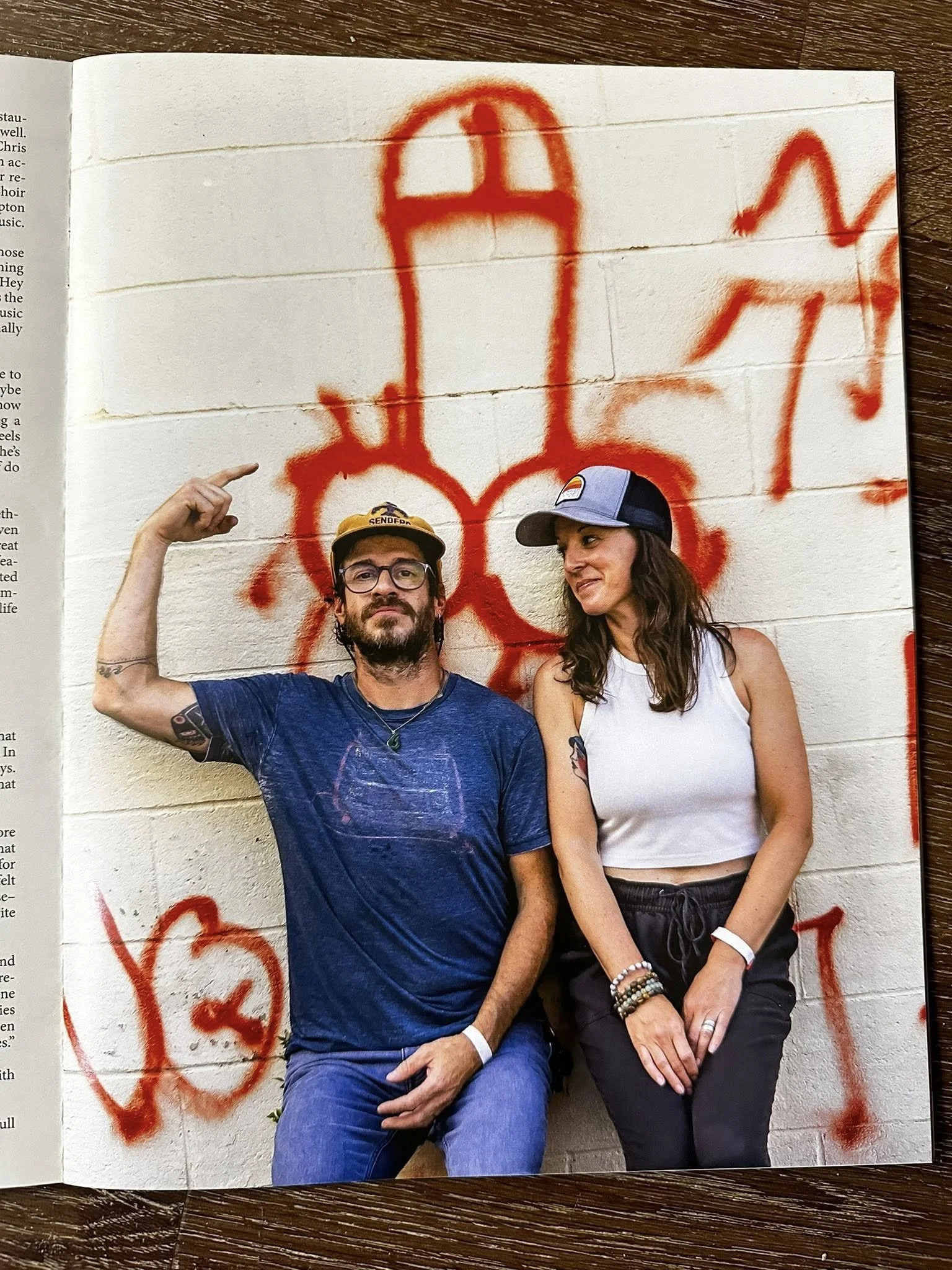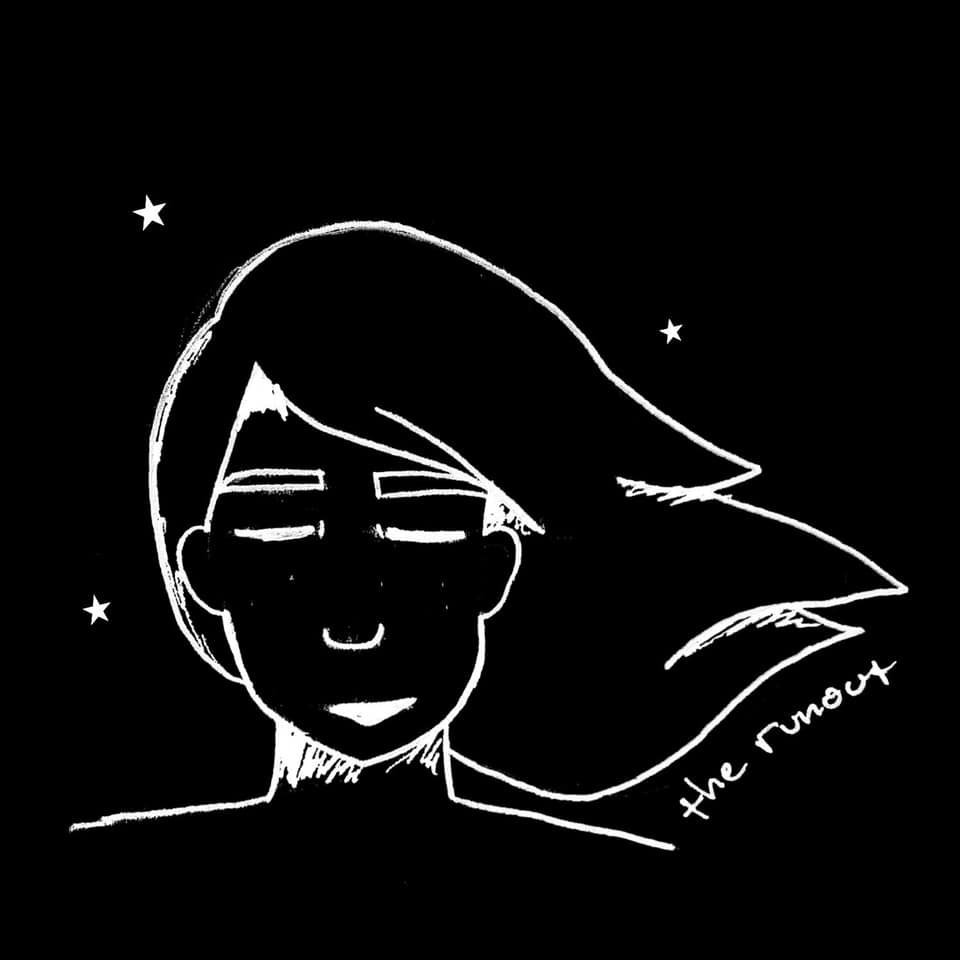There’s a moment on the new album from The Runout, Just As Real, that may sum up the past four years of the band’s existence. On “Light a Fire,” Jeff Gregory sings, “Do you think we could light a fire and stand around until we feel better? I’ll leave it to you now.” They lit a fire back in 2021 with their last full-length record, With Your Eyes Closed, and while they haven’t exactly been standing around, the band has spent the better part of the interim exploring what it means to make music together, and separately, and where they fit in the context of the greater community.
“There was writing all along, and intention,” says Gregory, the band’s principal songwriter, singer, and guitarist. “The whole while, I was making music, and getting pissed off about making music, like we all do. There were some of these songs that we played live for a couple of years or more, too. And then it got to a point where it was just that we needed to record, that I was dragging my heels, it felt like.”
Outside of some infrequent singles put online, the first project to see release over the summer was Hidden Variable, a short EP of songs featuring the acoustic duo version of the group, just Gregory and his wife Kelley B. Gregory, who provides crucial, sound-defining harmony vocals. Her presence softens Jeff’s sometimes stark, percussive style in ways that are hard to describe without hearing them together, as the voices intertwine in ways that only true intimacy and connection can muster. The duo arrangements really bring out the pair’s influences, with “When” evoking classic Simon and Garfunkel harmonies, and “The Millstone” possessing the plainspoken profundity of Dawes. It’s also an indicator of the upward progression of Gregory’s songwriting, which stands tall even in the unflinchingly exposed acoustic format. Take these opening lines from “The Millstone”:
i'm grateful for the grain
even Tuesday mornings never felt the same without the pain
i can picture raindrops falling on the blades of green
now the oats roll in my hands above this screen
like we rolled out in the fields in younger days
In one verse he’s expressed gratitude, a work ethic, and nostalgia for a more innocent time; the song goes on to describe, in the words of the introduction on the album’s Bandcamp page, “that blue collar urge to just survive and be a fucking good person in the modern era of perverse capitalism.” It’s a delicate balancing act, but one that Gregory has seemingly mastered.
Working this time around with producer and fellow musician Todd Mathis on the full band recordings, the parts were done in some different ways, Gregory says.
“My guitar parts and Kelley’s vocals were done in our kitchen on both the duo EP and the full band songs,” He says. “The EP was put out as-is, just us. For the band songs we shipped everything over to Todd, who put all the pieces together in his studio.”
Perhaps the biggest change in the way things were being done in recent years was the addition of the Runout Duo, putting Jeff and Kelley in places the band had never gone, and exposing them, their sound, and their original music to more and more audiences.
“The organic thing that has happened really slowly, but really surely with this is that we’re seeing people who are coming to a duo show at Columbia Craft, for example, and the next full band show they’re also showing up to see us as a full band.” The two feed off each other, in Gregory’s opinion.
“When we started doing the duo three years ago, I cut back to a two day a week job, from full time, so we could schedule more shows,” He says. “I’ve worried less about having a digital presence, playing the algorithm game, and building a huge social media crowd, and leaned more into the shows, the live music side of things.”
Gregory feels it has paid off in a more connected, loyal audience. “I’m finding that people are showing up, buying the shirts, wanting to have a physical CD or to be able to listen to the songs they hear us play,” He says. “It’s not hundreds of people–but it’s 45, or 50 people, that keep showing up.”
Those duo show experiences, playing covers for the bar and restaurant crowds alongside the original music, have fed the band as well. With Moses Andrews on bass, Mike Scarboro on drums, and Chris Compton on lead guitar, those other band members have been active outside of the Runout as well, with Andrews in particular releasing solo albums and playing in Patrick Davis’s Midnight Choir band, Scarboro playing drums with a host of others, and Compton has a long discography of his own excellent songwriting and music.
“We’re all creative individuals,” Andrews says. “You bring all those other experiences back here and now you’re at rehearsal jamming on a cover that Jeff and Kelley have been doing as a duo and ‘Hey let’s see what it sounds like with the whole band,’ and that grows the sound of the band that way. It’s also a function of how the music community in Columbia makes it easy, whether it’s professionally branching out, or just creative opportunities.”
“We try to have the culture of a family,” Scarboro says. “We like to set up practices with food, have a hangout session, and then maybe try to play some music. When you know each other so well, know each other’s personalities, you’re more comfortable delivering a new line, or an opinion or a thought on a song–So everybody feels like they can toss something out and see what Jeff says, and he’s really good about leaving a lot of openness for us to just kind of do our thing.”
Those close personal connections and years of playing both together and apart lend the band’s songs an easygoing familiarity, even if they’re new like the latest release. “Me and the Lord” is a great example, and one of the most fully fleshed out arrangements featuring the whole band. Over a rollicking organ and piano accented tune that’s straight out of the Leon Russell school of 1970s ensemble rock, Gregory declaims a non-materialistic way of living life and practicing one’s spiritual faith.
“and I ain't got money much
it gets between me and the lord
that may sound funny but
there ain't that much I can't afford”
“There seems to be a way that we do things, and I don’t know what culture this comes from–is it church culture? Nashville culture? In terms of music with formal stuff like lead sheets,” Gregory says. “Sometimes it just happens, sometimes songs are more format based and we can work them out like that.”
Then there are the ones that are more difficult, requiring more work. “Sometimes songs take a long time; ‘Currency’ was one that I wrote three times thinking that the guitar lick was going to be for something else,” Gregory says. “Then finally some other words felt better with it, and it settled, and never turned into anything else–and that was over the course of years. But then, some songs I write in five minutes.”
One result of the recent recording sessions is that they have found some things that really work well for them, Gregory says. “We realized that we really enjoy recording our vocals live, around one microphone, to get the harmony,” he says. “Because our harmonies lock differently in the timing if we try to record separately and then blend it in later. So it has just been moving us forward, on all sides.”
There’s even more movement in the works, Gregory says, with more releases planned out.
“All of the live shows that we did this past spring that were full band, Moses did a multi-track recording off the board feed,” He says. “So there’s going to be a full band live recording from those shows that comes out in early 2026, fingers crossed.”
It’s a strategic release, to put a bit of a marker down for the current lineup of the band which is still playing songs from throughout the group’s discography. “What that’s going to do for people who might just say ‘Oh cool, we get to hear a live version of ‘Currency’,’ but what some may not realize is that when they listen to that original album recording it’s not the people that they’re seeing live on stage now–so this will give them the current lineup playing these songs the way they see them do it on stage.”
There is a method to this multitude of material, Gregory says, even if they haven’t quite figured out what that is, exactly. “What we’re doing with all of this is that I’m trying to commit more to putting out tunes,” he says. “But now the question is if it’s going to happen in a duo format, or in the studio with the band, or did it happen at Mardi Gras last year and now you’ll hear it as that live version? We want to do songs in all these kinds of ways, and I want to make an authentic and earnest representation on a regular basis in town that people can access in different places.”
What the Runout has found, it seems, is their people. “EZ Shakes has been saying it for years, and they do it differently than we do,” Gregory says. “But it’s possible to create your niche, create your community, and they can nurture you. We have found that if you consistently make your music available and you’re patient, there are lots of interesting crowds–and they overlap. We don’t give people enough credit, I think, for what they’re interested in, and they’ll come out of the woodwork to find you and support you. Chris had different people supporting his solo music than we have supporting us, and Moses has different people, too. People are just hungry for that organic experience.”
Jasper Magazine photos by Perry McLeod






